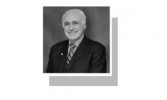HEINZ Kissinger sloughed many skins in his 100-year-long life. He shed Heinz to become Henry, his German ancestry to become an American, his original faith Judaism to become a faux Christian. He left Harvard academia to serve numerous US presidents (most notably Richard Nixon). Branded a ‘war criminal’ responsible for the deaths of over three million in Vietnam, Cambodia, and Laos, he accepted the Nobel Peace Prize in 1973, and then attempted to atone by returning it.
In his final years, he became a highly paid consultant — a ‘diplomat for hire’ — to world leaders. That clientele diminished as his contacts left office. They were augmented by corporate giants to whom Kissinger’s maturity rhymed with sagacity.
He marketed his unmatched experience as US national security adviser and later secretary of state mediating between countries, but reduced it to an infinitely more lucrative level as a detached go-between, bringing disparate ‘parties off their fixed positions’.
Walter Isaacson, in his perceptive biography Kissinger, summed up Kissinger’s complex personality as “brilliant, conspiratorial, furtive, sensitive to linkages and nuances, prone to rivalries and power struggles, charming yet at times deceitful”.
He could be all things to all men and women.
Kissinger could be all things to all men, and to women — especially Hollywood starlets whom he used as a camouflage whenever he wanted to distract the press from his actual amours. His enduring love — after himself — was his wife Nancy, who survives him. Towering over him, she maintained her svelte figure by having her stomach banded surgically.
Kissinger was a historian by training and a strategist by instinct. “Policy,” he once wrote, “is rooted in personality”, and there was no one in the world during the tumultuous 1970s and 1980s who was not seared by Kissinger’s combustible personality.
A Grand Master in the chess game of international realpolitik, he sacrificed states as players do pawns. The poet Horace’s comment applied to every country he ever manipulated: “Change only the name and this story is about you.”
To his lasting regret, the one post fate denied him because of his foreign birth was the presidency of his adopted country. Mao Zedong teasingly reminded Kissinger of this in Beijing in February 1972, taunting him that Nancy Tang (Mao’s assistant) was eligible because she had been born in Brooklyn.
Zhou Enlai could be equally pointed. Responding to Kissinger’s suggestion that they should negotiate in a language they both understood (ie English), Zhou Enlai retorted: “In which case, we should converse in German.”
Most senior Pakistanis are familiar with president Yahya Khan’s role in facilitating Kissinger’s secret visit to Beijing in July 1971. Few know of Kissinger’s instinctive ingratitude when he reached Beijing. Once there, Kissinger told Zhou Enlai that to communicate “rapidly, reliably and secretly”, they should establish “a secure direct channel which would not be vulnerable to the bureaucracies or developments in a Third World country”.
Zhou countered by proposing the Chinese embassy in Paris as the conduit, adding that “they should continue to pass some non-substantive notes through President Yahya who had been a good friend”. In a subsequent meeting with Nixon, Zhou was more candid: “President Yahya was probably a good man, a man of good intentions, but he didn’t know how to lead an army, how to fight.”
I never had the privilege of meeting Zhou Enlai, but I did interview Yahya Khan in Rawalpindi in 1975, and met Kissinger over dinner in Delhi in March 1997.
At the Asia Society conference the next day, I cornered Kissinger and obtained his autograph on his book Diplomacy. He inscribed it (by force of habit after dealing for decades with Arabs) “To F.S. Alijazuddin”.
Kissinger restricted access to his personal papers, saving them for his own use. I did, however, obtain president Yahya’s file on the Kissinger visit he arranged in July 1971. In 1999, following declassification of Nixon’s papers and Kissinger’s memos to him, Bill Burr published extracts in The Kissinger Transcripts. Bill introduced them to me in the National Archives in Washington. These provided invaluable source material for my book on Kissinger’s visit, titled From a Head, Through a Head, To a Head: The Secret Channel between the United States and China through Pakistan (2000).
I sent Kissinger a copy. His acknowledgment reached me elliptically. Someone who encountered him at Newark airport mentioned my name. Instantly, he chimed: “From a Head …,” adding, “Tell him I have read it, and enjoyed it.”
In the 1940s, a young Kissinger escaped the Holocaust. Visiting Nuremberg after the war, he described it as where he had said farewell to ‘his youth’.
In the 1970s, he approved genocide on a monstrous scale, denying millions theirs.
The writer is an author.
www.fsaijazuddin.pk
Published in Dawn, December 7th, 2023





















 Toi Staff
Toi Staff Gideon Levy
Gideon Levy Belen Fernandez
Belen Fernandez Andrew Mitrovica
Andrew Mitrovica Mort Laitner
Mort Laitner Rami G Khouri
Rami G Khouri Ali Fathollah-Nejad
Ali Fathollah-Nejad Nikkei Editorial
Nikkei Editorial
